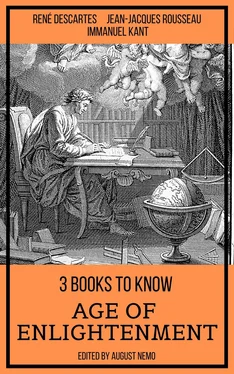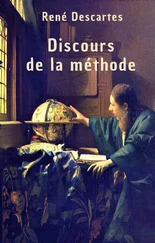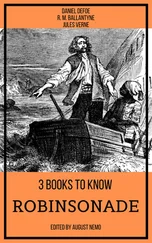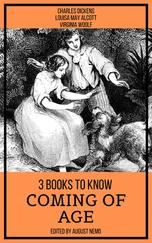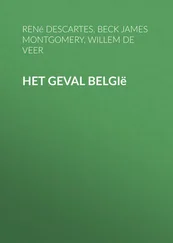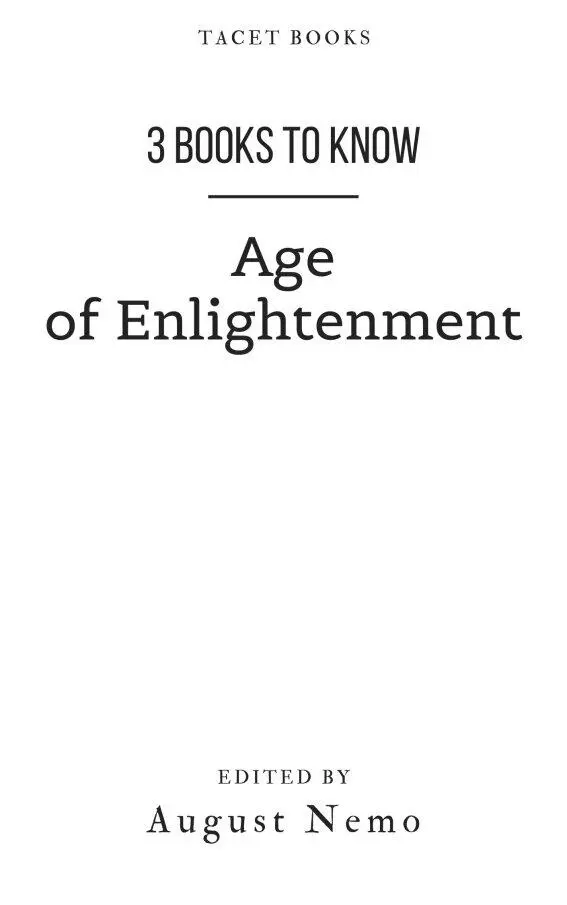
Title Page
Introduction
What is Enlightenment?
Discourse on the Method
The Social Contract
The Authors
About the Publisher


Welcome to the 3 Books To Know series, our idea is to help readers learn about fascinating topics through three essential and relevant books.
These carefully selected works can be fiction, non-fiction, historical documents or even biographies.
We will always select for you three great works to instigate your mind, this time the topic is: Age of Enlightenment
The Age of Enlightenment - or Age of Reason - was an intellectual and philosophical movement that dominated the world of ideas in Europe during the 17th and 18th centuries. The Enlightenment included a range of ideas centered on the sovereignty of reason and the evidence of the senses as the primary sources of knowledge and advanced ideals such as liberty, progress, toleration, fraternity, constitutional government and separation of church and state.
What is Enlightenment? by Immanuel Kant.
Discourse on the Method by René Descartes.
The Social Contract by Jean-Jacques Rousseau.
"What Is Enlightenment?" is a 1784 essay by the philosopher Immanuel Kant. Kant replied to the question posed a year earlier by the Reverend Johann Friedrich Zöllner, who was also an official in the Prussian government. Zöllner's question was addressed to a broad intellectual public community, in reply to Biester's essay entitled: "Proposal, not to engage the clergy any longer when marriages are conducted" (April 1783) and a number of leading intellectuals replied with essays, of which Kant's is the most famous and has had the most impact. Kant's opening paragraph of the essay is a much-cited definition of a lack of enlightenment as people's inability to think for themselves due not to their lack of intellect, but lack of courage.
Discourse on the Method is one of the most influential works in the history of modern philosophy, and important to the development of natural sciences. In this work, Descartes tackles the problem of skepticism, which had previously been studied by other philosophers. While addressing some of his predecessors and contemporaries, Descartes modified their approach to account for a truth he found to be incontrovertible; he started his line of reasoning by doubting everything, so as to assess the world from a fresh perspective, clear of any preconceived notions.
The Social Contract by Jean-Jacques Rousseau, is a 1762 book in which Rousseau theorized about the best way to establish a political community in the face of the problems of commercial society. The Social Contract helped inspire political reforms or revolutions in Europe, especially in France. The Social Contract argued against the idea that monarchs were divinely empowered to legislate. Rousseau asserts that only the people, who are sovereign, have that all-powerful right.
This is one of many books in the series 3 Books To Know. If you liked this book, look for the other titles in the series, we are sure you will like some of the topics.


by Immanuel Kant
––––––––

Enlightenment is man's release from his self-incurred tutelage. Tutelage is man's inability to make use of his understanding without direction from another. Self-incurred is this tutelage when its cause lies not in lack of reason but in lack of resolution and courage to use it without direction from another. Sapere aude! "Have courage to use your own reason!" - that is the motto of enlightenment.
Laziness and cowardice are the reasons why so great a portion of mankind, after nature has long since discharged them from external direction (naturaliter maiorennes), nevertheless remains under lifelong tutelage, and why it is so easy for others to set themselves up as their guardians. It is so easy not to be of age. If I have a book which understands for me, a pastor who has a conscience for me, a physician who decides my diet, and so forth, I need not trouble myself. I need not think, if I can only pay - others will easily undertake the irksome work for me.
That the step to competence is held to be very dangerous by the far greater portion of mankind (and by the entire fair sex) - quite apart from its being arduous is seen to by those guardians who have so kindly assumed superintendence over them. After the guardians have first made their domestic cattle dumb and have made sure that these placid creatures will not dare take a single step without the harness of the cart to which they are tethered, the guardians then show them the danger which threatens if they try to go alone. Actually, however, this danger is not so great, for by falling a few times they would finally learn to walk alone. But an example of this failure makes them timid and ordinarily frightens them away from all further trials.
For any single individual to work himself out of the life under tutelage which has become almost his nature is very difficult. He has come to be fond of his state, and he is for the present really incapable of making use of his reason, for no one has ever let him try it out. Statutes and formulas, those mechanical tools of the rational employment or rather misemployment of his natural gifts, are the fetters of an everlasting tutelage. Whoever throws them off makes only an uncertain leap over the narrowest ditch because he is not accustomed to that kind of free motion. Therefore, there are few who have succeeded by their own exercise of mind both in freeing themselves from incompetence and in achieving a steady pace.
But that the public should enlighten itself is more possible; indeed, if only freedom is granted enlightenment is almost sure to follow. For there will always be some independent thinkers, even among the established guardians of the great masses, who, after throwing off the yoke of tutelage from their own shoulders, will disseminate the spirit of the rational appreciation of both their own worth and every man's vocation for thinking for himself. But be it noted that the public, which has first been brought under this yoke by their guardians, forces the guardians themselves to remain bound when it is incited to do so by some of the guardians who are themselves capable of some enlightenment - so harmful is it to implant prejudices, for they later take vengeance on their cultivators or on their descendants. Thus the public can only slowly attain enlightenment. Perhaps a fall of personal despotism or of avaricious or tyrannical oppression may be accomplished by revolution, but never a true reform in ways of thinking. Farther, new prejudices will serve as well as old ones to harness the great unthinking masses.
Читать дальше
